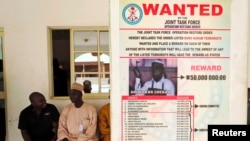ABUJA —
In Nigeria, many people believe Abubakar Shekau leads Boko Haram, the Islamist militant group blamed for thousands of deaths. A man who sounds like Shekau is heard in a new audio message distributed to journalists, raising questions about claims the terrorist is dead.
Boko Haram used to post its videos on YouTube, but now it sends copies to a couple of journalists in northern Nigeria who distribute them to trusted colleagues and eventually the news agencies. Often the videos are transferred to audio-only files to accommodate the shoddy communications network in northern Nigeria.
This is the latest Boko Haram audio file making its way around Nigeria. It is distinctly the voice of Abubakar Shekau, or a very good impersonation of him. Speaking in the local Hausa language, he says Boko Haram has seized enough weapons to maintain a sustained war to turn Nigeria into his version of an Islamic state, which includes death for non-believers.
But he does not take responsibility for any specific recent attacks, most notably the September 29 raid on a college dormitory where about 40 students were killed, some while they were sleeping.
Nigerian authorities say Boko Haram is losing its power in northern Nigeria. Army spokesperson Brigadier General Ibrahim Attahiru says, “Our operations in the northeast have continued to [destroy] terrorist activities, thereby denying them freedom of action. For the last few weeks there were incidences of Boko Haram terrorists, unprovoked malicious attack and wanton destruction of life and property.”
He says Boko Haram is still conducting attacks, but the military is moving in on the group and apprehending suspects.
Other authorities say that recent security forces successes against Boko Haram include the killing of Shekau.
This is a video released last week of a man who looks and sounds like Shekau saying he is alive. Security forces later told Nigerian newspapers the video was doctored to “sustain a non-existent continuum in leadership.”
But some analysts say both the Boko Haram statements - whoever they came from - and the security forces' claims are a smokescreen, designed by powerful politicians to keep the public confused and the northeast in chaos.
Clement Nwankwo, who heads the Policy and Legal Advocacy Center in Abuja, says, “If you have a military presence in virtually all parts of the north then you are able to determine the number of people that come and vote. If there is fear then it means that a lot of people in the area where you think you do not have support do not necessarily come out and vote.”
During the past four years, Boko Haram has claimed responsibility for attacks on schools, churches, mosques, security forces, banks and the government. Nwankwo says in the past some authorities have declared Shekau dead, while others maintained he was alive.
The only thing 100 percent verifiable, he says, is that innocent people continue to be killed.
Abdulkareem Haruna contributed to this report from Maiduguri
Boko Haram used to post its videos on YouTube, but now it sends copies to a couple of journalists in northern Nigeria who distribute them to trusted colleagues and eventually the news agencies. Often the videos are transferred to audio-only files to accommodate the shoddy communications network in northern Nigeria.
This is the latest Boko Haram audio file making its way around Nigeria. It is distinctly the voice of Abubakar Shekau, or a very good impersonation of him. Speaking in the local Hausa language, he says Boko Haram has seized enough weapons to maintain a sustained war to turn Nigeria into his version of an Islamic state, which includes death for non-believers.
But he does not take responsibility for any specific recent attacks, most notably the September 29 raid on a college dormitory where about 40 students were killed, some while they were sleeping.
Nigerian authorities say Boko Haram is losing its power in northern Nigeria. Army spokesperson Brigadier General Ibrahim Attahiru says, “Our operations in the northeast have continued to [destroy] terrorist activities, thereby denying them freedom of action. For the last few weeks there were incidences of Boko Haram terrorists, unprovoked malicious attack and wanton destruction of life and property.”
He says Boko Haram is still conducting attacks, but the military is moving in on the group and apprehending suspects.
Other authorities say that recent security forces successes against Boko Haram include the killing of Shekau.
This is a video released last week of a man who looks and sounds like Shekau saying he is alive. Security forces later told Nigerian newspapers the video was doctored to “sustain a non-existent continuum in leadership.”
But some analysts say both the Boko Haram statements - whoever they came from - and the security forces' claims are a smokescreen, designed by powerful politicians to keep the public confused and the northeast in chaos.
Clement Nwankwo, who heads the Policy and Legal Advocacy Center in Abuja, says, “If you have a military presence in virtually all parts of the north then you are able to determine the number of people that come and vote. If there is fear then it means that a lot of people in the area where you think you do not have support do not necessarily come out and vote.”
During the past four years, Boko Haram has claimed responsibility for attacks on schools, churches, mosques, security forces, banks and the government. Nwankwo says in the past some authorities have declared Shekau dead, while others maintained he was alive.
The only thing 100 percent verifiable, he says, is that innocent people continue to be killed.
Abdulkareem Haruna contributed to this report from Maiduguri







